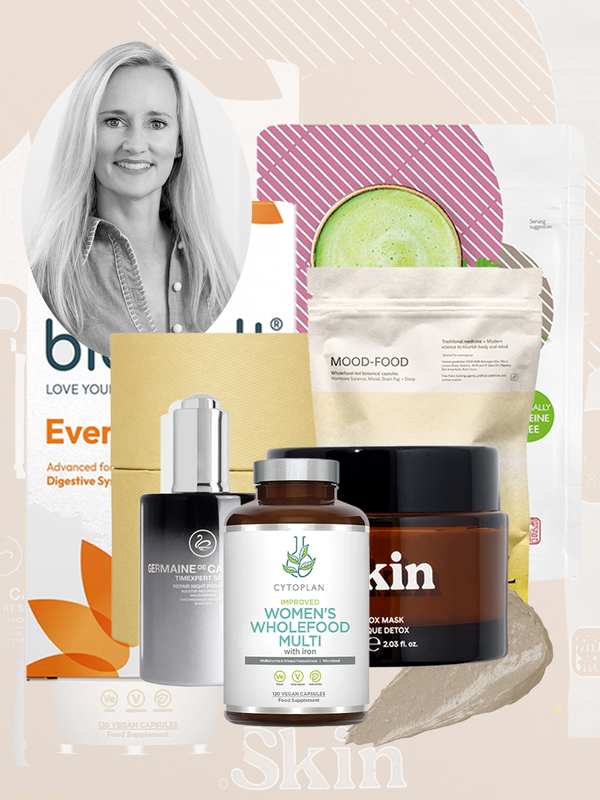

An Expert Guide To Vitamin Supplements
Let’s start with why a nutritional supplement is important – is it really needed when you should get all the nutrients from a balanced diet?
While a balanced diet is ideal, there are reasons some people might need extra nutritional support, such as a plant-based diet, genetics, life stages, absorption issues, age, hormones, stress, illness or medication. Modern-day stresses deplete nutrients and no diet is perfect – many of my clients have some kind of deficiency and supplements provide concentrated nutrients to support that.
So what can you get from a supplement that you can’t get from a balanced diet?
Supplements often provide higher bioavailability, meaning certain nutrients are absorbed better. For example, non-haem iron from plants is harder to absorb than animal-sourced iron. Additionally, certain nutrients, like vitamin D, are hard to get from diet alone. Dietary restrictions, soil depletion, and age also play roles in limiting nutrient intake, and certain life stages, like pregnancy or stress, increase nutrient needs beyond what diet can provide.
Do you need to test to see if you’re low in nutrients?
Testing isn’t always necessary – a good-quality multivitamin should cover all bases. However, if there is a specific nutritional or medical concern, then it’s best to consult with a qualified nutritional therapist or medical practitioner, who can guide you to the most appropriate tests.
Can you take too many supplements?
Yes. Fat-soluble vitamins (A, D, E and K) can accumulate in the body and become toxic, while water-soluble vitamins are typically excreted via the urine. Too much iron can cause organ damage, and excess calcium can cause kidney stones and imbalances in other minerals such as magnesium and zinc.
What are the most common deficiencies and are there any supplements that you feel everyone should take?
Vitamin D
This is vital for immunity, bone health and mood, and it’s often lacking in those with limited sun exposure. Take a vitamin D supplement with K2 for better absorption, such as Terra Nova Vitamin D3 with K2.
Iron
Needed for oxygen transport and energy, this is important for menstruating women, vegans and vegetarians. An iron supplement that is kind to the gut is Thorne Ferrasorb.
B12
This supports the nervous system and is found mainly in animal products, so it’s often lacking in vegans and vegetarians. Take B12 as part of a good-quality multivitamin such as Cytoplan Women’s Wholefood Multi.
Magnesium
This helps with muscle and nerve function, blood sugar balance, mood and sleep, energy and bone health. Poor diet, high sugar intake, excess alcohol, stress and age can all deplete magnesium levels, so it’s a common nutrient deficiency. Pure Encapsulations Magnesium Glycinate is a form that is absorbed well.
Omega-3
So important for heart health and brain function. It is also a really powerful anti-inflammatory. For something good quality that comes from a sustainable source, try Bare Biology Rise & Shine.
Are there any reasons why you shouldn’t supplement?
Yes. There might be potential medication interactions, so always check with your medical practitioner before taking a supplement if you have a diagnosed condition or are on any medication. If you are pregnant or breastfeeding, only take supplements specifically formulated for those stages.
Is there a time of day that’s best to take your supplements?
Generally, take them in the morning with food for better absorption. Some supplements, like those for the gut, work better on an empty stomach, while sleep supplements can be taken at night.
What should you look for in a multi-vitamin?
Combinations of vitamins and minerals
For better absorption, take vitamin D with K2, curcumin with piperine (found in black pepper), iron with vitamin C, magnesium with vitamin D, and zinc with copper as they balance each other out.
No synthetic fillers, binders and additives
Try to avoid things like artificial binders, colours and preservatives.
Be targeted
Choose a multivitamin specifically for you. There are women’s formulas out there, and the pre-natal, perimenopause and post-menopause all require different nutrients.
Consider convenience
If a supplement only comes in powder form and needs to be mixed into a smoothie, ensure it’s something you’ll realistically use, or you may not take it consistently.
What’s the difference between synthetic and whole-food supplements?
Synthetic Supplements are lab-made to mimic natural vitamins, while wholefood supplements come from real foods (fruit, vegetables or herbs) and may be better absorbed. Choose high-quality versions of either type.
How long should you take a supplement before you see results?
It really depends on the supplement and how deficient you might have been in a particular nutrient, but typically one to three months. Iron can take two to three months, magnesium may work in weeks, and probiotics and energy-boosting supplements may have immediate effects.
Shop These Expert-Recommended Supplements
Terra Nova Life Drink: An all-round antioxidant powder that also contains mushrooms, digestive enzymes, superfoods and pre- and probiotics to support the gut and overall health and immunity.
BodyBio Calm: Contains calming amino acids and adaptogens to help help you feel more relaxed through life’s everyday stresses.
Ancient + Brave Collagen: Great for glowing skin, thicker hair and to help reduce aching joints.
GP Nutrition Cleanse Complex: This contains a healthy dose of antioxidants, superfoods and nutrients to support liver function.
Nue Co Collagen Gut Barrier+: Contains 5,000mg of grass-fed bovine collagen peptides with vitamins to help strengthen the gut barrier, support skin health and connective tissue, and enhance gut microbiome diversity.
Microbz Revive: to help repair your gut. Living microbes are fermented with l-glutamine and slippery elm, designed to soothe and treat inflammation anywhere along the digestive system from mouth to bottom.
Kiki Health Multi: mushroom blend to help support immunity and to improve mental clarity and function.
Nue Co D3 spray: is combined with vitamin K2 for better absorption. Most of us are deficient in vitamin D and this daily spray that supports immune health, maintains bone strength, and boosts mood.
Pure Encapsulations Magnesium Glycinate: for sleep, energy and mood. One of the only supplements I’d take before bed.
Ancient & Brave True Ashwaganda: to calm the nervous system and help us to adapt to stress. It naturally reduces cortisol, enhances immune function and restores a more balanced mind.
Pure Encapsulations O.N.E. Multivitamin: is a daily multi vitamin that vitamins, minerals and phytonutrients that are in their most absorbable form. Great for both men and women.
Rheal Superfoods Clean Greens: is an effective daily supply of super greens that you can easily add to water or smoothies. Contains lots of potent ingredients such as spirulina, wheatgrass, chlorella and baobab to support immunity, digestion and energy.
DISCLAIMER: Features published by SheerLuxe are not intended to treat, diagnose, cure or prevent any disease. Always seek the advice of your GP or another qualified healthcare provider for any questions you have regarding a medical condition, and before undertaking any diet, exercise or other health-related programme.
DISCLAIMER: We endeavour to always credit the correct original source of every image we use. If you think a credit may be incorrect, please contact us at info@sheerluxe.com.





